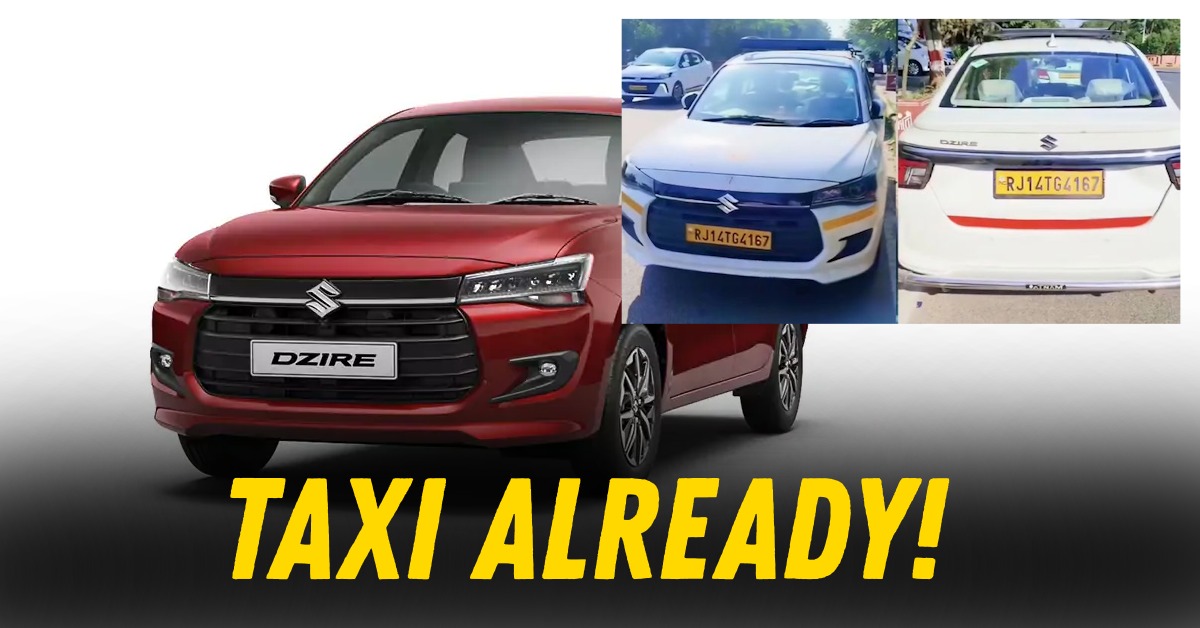The New Maruti Dzire Hits Taxi Stand Just 3 Months After Launch


Maruti Suzuki recently launched the new-generation Dzire in the Indian market in Nov 11, 2024. As the most popular sedans in the sub-4-meter segment, the Dzire has built a strong reputation among private buyers. However, despite Maruti’s initial announcement that the new Dzire would not be available for the commercial sector, recent developments suggest otherwise. A video shared by Raftaar 7811 on YouTube reveals a new-generation Dzire in Rajasthan sporting commercial registration plates. The production of the previous (third-generation) Dzire seems to have come to an end—it is not available on the company website.
A Pattern Repeats Itself
This isn’t the first time Maruti Suzuki has done it—but it’s the first time it has happened so quickly. The previous-generation Dzire was initially reserved for private buyers, with the older Swift Dzire being positioned for the taxi market as the Dzire Tour S variant.
However, as time passed, Maruti made the last-generation Dzire available for commercial use. The reason behind this phased strategy is to maintain the sedan’s aspirational image, as car buyers in India often shy away from models that are widely used as taxis.
Despite this, the Dzire remains a practical choice for commercial use due to its spacious cabin and comfortable ride. Given Maruti Suzuki’s history, it was only a matter of time before the new Dzire entered the commercial market.
Powertrain and Efficiency
The new Dzire is powered by a 1.2-liter, 3-cylinder petrol engine shared with the latest Swift. It delivers 80 Bhp and 111 Nm of torque and comes with both manual and AMT gearbox options. A CNG variant is also available, offering 69 Bhp and 101 Nm of torque.
| Variant | Power Output | Torque | Fuel Efficiency (ARAI Certified) |
|---|---|---|---|
| Petrol (Manual) | 80 Bhp | 111 Nm | 24.97 kmpl |
| Petrol (AMT) | 80 Bhp | 111 Nm | 25.71 kmpl |
| CNG | 69 Bhp | 101 Nm | 33.73 km/kg |
The fuel efficiency numbers make the Dzire one of the most economical choices in the segment, which is a key factor for taxi operators.
Safety and Build Quality
One of the most significant improvements in the new-generation Dzire is its safety features. Maruti has worked on the build quality, and the sedan now boasts a 5-star Global NCAP rating. Unlike its predecessor, the current Dzire comes with six airbags as standard, making it one of the safest options in its segment, including the taxi market. This would make it the first widely-used commercial sedan in India to offer such safety features.
A Dominant Force in the Taxi Market
Since Toyota discontinued the Etios sedan, the Dzire has dominated the taxi segment, particularly in ride-hailing services like Ola and Uber. The Dzire’s affordability, efficiency, and reliability make it an ideal choice for commercial use.
| Model | Ex-showroom Price (Base Variant) | Notable Features |
|---|---|---|
| Maruti Dzire (New) | Rs. 6.79 lakh | 6 airbags, high efficiency |
| Hyundai Aura | Rs. 6.49 lakh | CNG option, digital instrument cluster |
| Honda Amaze | Rs. 7.16 lakh | Strong build, CVT option |
The Taxi Image Dilemma
Some car buyers hesitate to purchase models commonly used as taxis due to perceived brand dilution. However, the Dzire has consistently managed to attract both private and commercial buyers across three generations. The introduction of a Tour S variant will likely maintain a distinction between private and commercial trims, ensuring that private buyers continue to consider the Dzire as an aspirational purchase.
Conclusion
The shift of the new Dzire into the taxi market was inevitable. With the older model being phased out and Maruti’s deep-rooted presence in the commercial vehicle space, the new Dzire will soon become a staple for cab operators. Its blend of affordability, fuel efficiency, and safety enhancements ensures that it will continue to be a top choice in the segment. As and when the Tour S variant officially debuts, India may see its first popular taxi with six airbags as standard—marking a significant step forward in commercial vehicle safety.